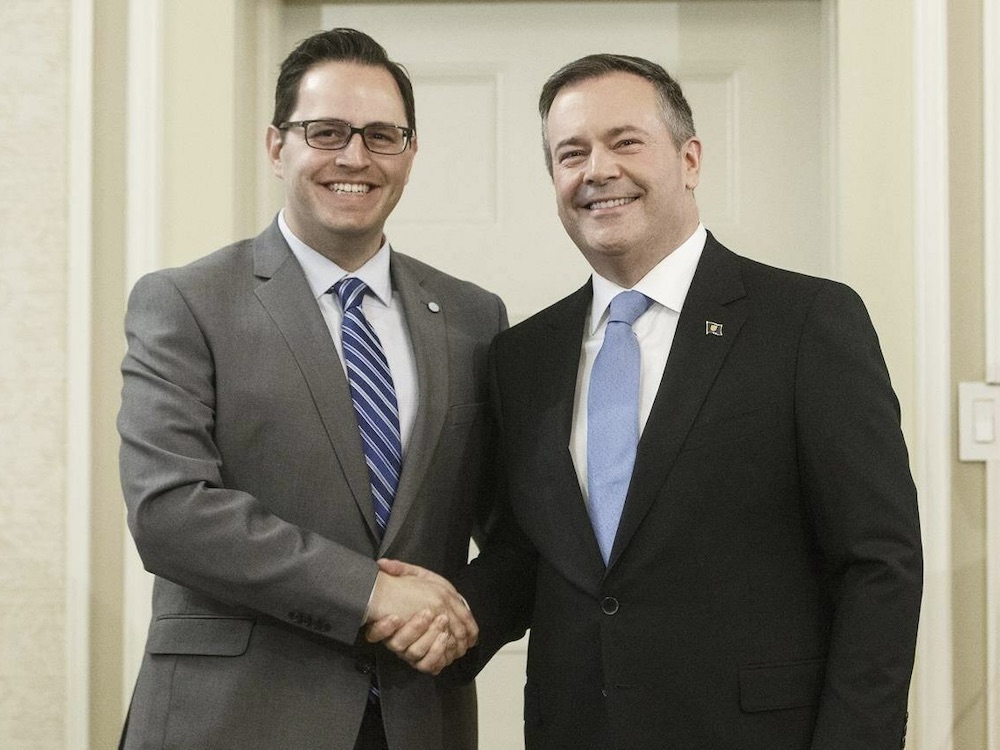An expert in university governance called it the worst political interference in a Canadian university in more than a century.
But despite an escalating campaign of bellicose threats and firings over the past eight months, Alberta Advanced Education Minister Demetrios Nicolaides appears to have mostly failed to force a mass relocation of Athabasca University staff to the small town of Athabasca to bolster its economic development.
Nicolaides also effectively failed to force Athabasca, Canada’s top online university, to abandon its near-virtual strategy, which allows senior administrators, academics and other staff to work remotely, while serving 43,000 online students across Alberta, Canada and the world.
In a news release Wednesday, Nicolaides claimed victory, saying the university’s board of governors had unanimously voted to approve an investment management agreement between his ministry and the university that sets local employment targets for executive and administrative staff in the town of 2,800, about 150 kilometres north of Edmonton.
The vote, however, was not unanimous; there was one abstention. And the agreement represents a major climb down for Nicolaides, said Sir John Daniel, a world respected expert in distance learning.
"It is good to see that Minister Nicolaides has come to his senses in his battle with Athabasca University and has abandoned most of his sillier ultimatums,” Daniel said in an emailed statement.
“But, we have had false dawns before and I worry about his reneging on some commitments once the story is no longer news,” he said.
Earlier this year, Nicolaides fired board chair Nancy Laird and all the board members who hadn’t resigned, including Daniel, and replaced them with handpicked political appointees after the board refused to accede to his directives. Nicolaides publicly stated he did so to ensure his directives were implemented.
Nicolaides did not acknowledge an interview request.
Months ago, Nicolaides threatened to slash the university’s operating grant of $3.4 million a month unless it forced 65 per cent of its staff — about 500 people plus their spouses and children — to live and work in Athabasca.
Experts told The Tyee this was logistically impossible because it would overwhelm the town. Nicolaides later claimed this figure was simply an opening bargaining position.
The new IMA signed this week only increases administrative staff in the town by 25, from 252 to 277, and requires only four executives, including president Peter Scott, to work in Athabasca within three years.
But the IMA waives financial penalties set for 2022-23 for not meeting the staffing targets. The ministry signs new funding agreements with universities each year by March 31, which means the university can essentially ignore the local staffing targets for both administration and executive staff until March 31, 2023.
The new IMA also directs the university to cease implementation of its near-virtual strategy. But the university already has fully implemented its near-virtual strategy, so ceasing it now is effectively moot.
The signing of the IMA has not been without consequence, however. Scott so far has not indicated he will quit but on Thursday two senior executives resigned within hours of the board’s decision.
Both Daniel and University of Toronto professor Glen Jones, an expert in university governance, had said Nicolaides’ original IMA, if implemented, would cause resignations that could threaten the university’s survival.
Jones called Nicolaides’ final ultimatum “the most egregious political interference in a public university in Canada in more than 100 years.” Daniel was less diplomatic. He called it “completely stupid” and suggested president Peter Scott would likely quit if it wasn’t amended.
Nicolaides began his escalating pressure campaign in March. This fall, Deborah Meyers, the university’s vice-president of finance and performance services, and chief human relations officer Charlene Polege both told president Peter Scott they were thinking of leaving.
“Since that time, I have been working very hard to find a way to retain them, their incredible leadership and expertise,” Scott said in a news release announcing their resignation Thursday.
“The last months and particularly, the last few days have been challenging for AU, and I regret to share that I have not been successful in my work to retain these exceptional leaders.”
Both Jones and Daniel said recruiting replacements for highly skilled and experienced staff will be much more difficult if they’re required to live in Athabasca.
“What we’re seeing is a lesson on how to create uncertainties when taking stupid approaches with universities that cause people to leave,” Daniel said. “But [president Peter Scott] can probably survive this one compared to where this all started.”
Daniel believes Scott, who declined a Tyee interview request, will continue in the job at least until the next election scheduled for May.
Premier Danielle Smith’s United Conservative Party is now trailing by nine points in the polls even as it continues to advance deeply unpopular policies, most specifically the controversial Alberta Sovereignty within a United Canada Act.*
Alberta’s opposition NDP have promised, if elected, to tear up the investment management agreements. The agreements tie university funding to performance measures such as employment rates for graduates.
“By the time this all gets processed, we will all be in another year and quite conceivably Alberta will have another government,” Daniel said.
“It seems like major progress but I suppose that is like saying when you bang your head against the wall it feels nice when you stop.”
If you have information for this year, or for another story, please contact Charles Rusnell via email in confidence.
* Story updated on Dec. 2 at 3:30 p.m. to correct the United Conservative Party’s performance in the polls. ![]()

















Tyee Commenting Guidelines
Comments that violate guidelines risk being deleted, and violations may result in a temporary or permanent user ban. Maintain the spirit of good conversation to stay in the discussion.
*Please note The Tyee is not a forum for spreading misinformation about COVID-19, denying its existence or minimizing its risk to public health.
Do:
Do not: